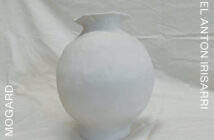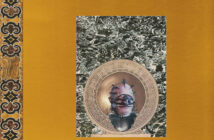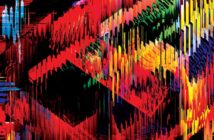
Since 2005, Bristol-based duo James Ginzburg and Paul Purgas have trod a path between the musical and the artistic. Techno has played a part in their project, but so too has the role of architecture in sound, and they’ve created installations for galleries which examine how a space influences the sounds made within.
Recur, their first full-lengther for Raster-Noton, clocks in at just over half an hour and manages to convey all the oppressive, nervous energy and over-the-shoulder paranoia some artists need an hour to muster. It is resolutely more architectural than musical, with much of the instrumentation on the album being corralled by fuzz and clouds of distortion, a Silent Hill fog which obscures the environment we just know is out there.
In keeping with the album’s title, ideas crop up again and again. Opener ‘Origin’, begins with cycles, attacks of beats and a hum of wires. A stuttering machine noise, a sensation of power being applied to a truculent machine amid a storm of noise. This feeling of wintry blast, of struggle appears throughout. The hitching, halting sound of an enormous engine struggling into life appears in ‘Fragment’, the title track and elsewhere. It’s tempting to consider Recur almost a set of variations on a theme.
In interview, the pair have said they are keen on examining the relationship between time, structure and sound – something underscored by the importance of reverb to this work. Throughout, the ideas of spaciousness versus claustrophobia, of purity of signal versus distorted, reflected noise are examined.
‘Disperse’ is the most brutally effective investigation of a sense of place. We’re dropped into an Eraserhead soundscape, in the middle of a demented game of Pong. Rebounds, questions and answers beat the listener, as sound is pushed until it screams, transforms into chopped versions of itself. A minute from track end, we’re taken from this robotic game and thrust outside, into what sounds like the darkened waiting-space of a bus terminal. It’s as if one’s hearing is struggling to return to normal after a battering concert, when all that’s heard is the trundle of transport.
The sense of location is vivid. It’s also used – to dislocating effect – in ‘Absence’, which resembles a SleepResearch_Facility track circa Nostromo. In contrast to the kicks and adherence (however loose) to 4/4 that mark tracks elsewhere – especially ‘Instant’, an apparent aural time-and-motion study of the arc of a kick pedal – this is the sound of stasis, of the immense rumbling of a machine running as it should. It feels like a Cagean 4’33” piece designed to encourage reflection, until an approaching noise makes itself known, pushing so hard that it distorts until it eventually becomes silence. There’s the feeling of a journey taken but without knowing where we’ve gone.
The ear’s unreliable narrator is put to the test with this album. It’s the aural equivalent of looking at a stick in the water: is it bent or is it straight? Is it both? Recur is an essential, creepy release. It’s rhythmic, but they’re the oblique rhythms of the ghost in the machine, struggling for release.
LUKE MARTIN



